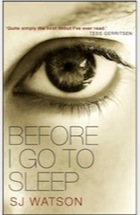 Imagine waking up every morning with your memory wiped clean. You wonder who you are, where you are and who is the man lying in bed next to you. This amnesia is the problem faced by Chrissie, a middle aged married woman. Every day she must learn afresh, only to lose it all again once she goes to sleep. Then a doctor persuades her to keep a journal and slowly she begins to rebuild her life. But is everything really as it seems? Why does her husband keep so much from her?
Imagine waking up every morning with your memory wiped clean. You wonder who you are, where you are and who is the man lying in bed next to you. This amnesia is the problem faced by Chrissie, a middle aged married woman. Every day she must learn afresh, only to lose it all again once she goes to sleep. Then a doctor persuades her to keep a journal and slowly she begins to rebuild her life. But is everything really as it seems? Why does her husband keep so much from her?This is the first novel by SJ Watson, an NHS audiologist, written between shifts at London St Thomas hospital. It was inspired in part by the true story of Henry Molaison, the subject of the play 2401 Objects reviewed in an earlier post.
Before I Go To Sleep is a real page-turner, hooking the reader from the very first page. Not only a well-paced thriller, it also examines the construction of memories. Just how much is actual memory and how much is confabulation?
I did enjoy this book, but I'm surprised at the effect a year of Nineteenth Century Novel study has had on me. I missed the slow build and the opportunity to reflect as I turned the pages.
After defending genre fiction in The Reading Room's engaging debate, I'm beginning to wonder if I am a literary snob after all.
I enjoyed this one Karen but I'm far from being a literary snob! I enjoy the escapism of a good page turner and have no desire to reflect and analyse when reading for pleasure. I wonder if studying literature and creative writing might actually spoil our ability to enoy an uncomplicated, well written story?
ReplyDeleteI know what you mean Denise. I was worried that studying literature might diminish my love of reading for pleasure. In fact, I think it's done the opposite. Certainly my tastes have changed and my concentration levels have improved immensely. Middlemarch and Dombey & Son are great training in that respect!
DeleteStudying creative writing has made me ask why a book was written in one way and not another, and generally made me more appreciative of the writer's craft.
I have this to read and am waiting for the right moment. I find I can put myself off a book so easily if it's not exactly what I want to be reading. At the moment I seem to be lost in a load of books that are all very ambitious and in consequence, don't always hit their targets. So now I'm feeling like I really want a good genre novel that knows exactly what it's doing. And probably after that, I'll feel the need of something more challenging again! So I don't think you are a snob at all, just steeped in 19th century fiction so the shift to something so different feels stark.
ReplyDeleteLike you, Litlove, I have to be in the right mood for a particular book. I can rush to buy a novel on the back of a great review and then let it languish, untouched, on the shelf for months until the right moment comes along.
DeleteFor me, 'ambitious' books are a little like buying 'aspirational' cocktail dresses for a lifestyle I just don't lead. I'd love to be the earnest educated soul that reads 'ambitious' books, but actually I know I'm not.
With this particular book I think you're right. It's the shift that's so disconcerting.
No, definitely not a snob, just appreciative of a different style of writing. I actually found this book very difficult even though I enjoy a good page turner as much as the next reader. Unlike Denise, I don't think studying literature makes me unappreciative of an uncomplicated well-written story. In fact I think I enjoy a well-written detective better than a book that has pretensions to be a literary novel but is really just pretentious. One of the things that the nineteenth century novel does superbly well is tell a good story.
ReplyDeleteIt's true Alex, there are some great stories amongst the nineteenth century novels.
DeletePerhaps the biggest difference is in the pace of the narrative. Are readers generally less patient nowadays?
Yes, I think you could make out a case for that. We are all so used to the pace of soap operas which move from one scene to another very quickly. Building up reading stamina takes practice.
Delete